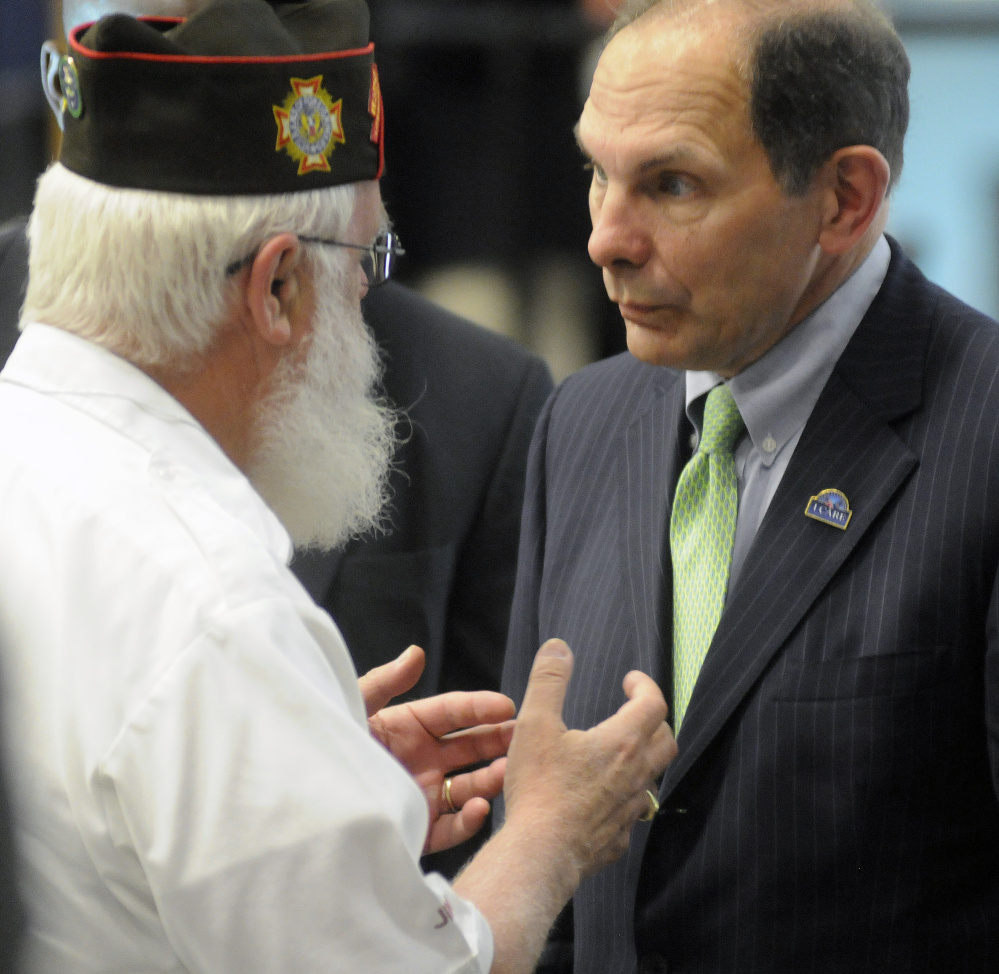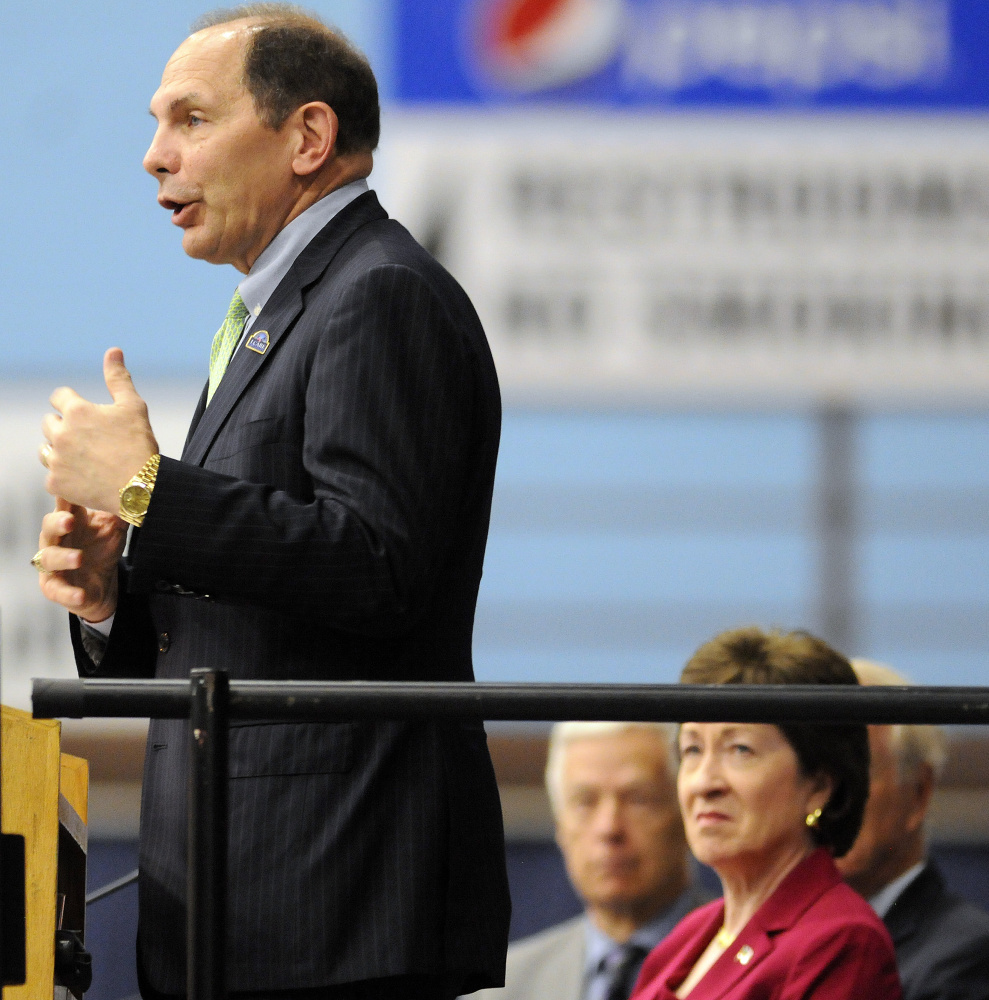AUGUSTA — U.S. Department of Veterans Affairs Secretary Robert McDonald told a group of veterans’ advocates Thursday in Augusta that his department has worked to shorten wait times and reduce delays that have plagued the department in recent years.
The secretary, a former CEO of Procter & Gamble, gave a keynote address at the Maine Military and Community Network conference and highlighted several changes to the way the department operates.
“We want to be the best customer service organization in the federal government,” McDonald said during his first official visit to Maine since his July 2014 confirmation. “I made the commitment to transform the VA into a world-class, customer-focused, veterans-centered enterprise.”
McDonald said the department, which was mired in a scandal about access to care and lengthy wait times before he was confirmed, now completes 97 percent of appointments within 30 days, 92 percent within 14 days and 86 percent within seven days. The department completed 5 million more appointments during the past fiscal year compared to the previous one; and nationally, the average wait time is five days to see a primary care doctor, six days to see a specialist and two days to see a mental health provider.
“We’re on track and are making progress, but we still have work to do,” McDonald said. He talked at length about improvements to the veteran experience, including changes to the VA’s website and phone number, making it a “one-stop shop for information rather than asking veterans to navigate a complicated system.”
At VA Maine Healthcare Systems-Togus, just east of Augusta, the director said earlier this month that 99 percent of veterans who seek care in Maine are getting appointments within 30 days and that Togus has hired nearly 200 employees in the last two years to improve services.
McDonald’s remarks were preceded by comments from Maine’s congressional delegation, whom he called “strong leaders in Washington, D.C., for veterans.”
Sens. Susan Collins, R-Maine, and independent Angus King; and Reps. Chellie Pingree, D-1st District, who sent a video message to the conference, and Bruce Poliquin, R-2nd District, who attended, all said the state is committed to doing everything it can to help veterans.
King said the technological improvements are important because they make it easier for veterans to communicate with the department. Access and transportation, King said, continue to be the biggest problems in Maine, but the department is making strides to improve those areas too.
“(Secretary McDonald) is taking the VA into at least the 20th, and maybe, the 21st century,” King said after his remarks. “It’s about utilizing the technology, especially in rural states like ours.”
A new mobile app, which McDonald said would be launched by the end of the year, will allow veterans to make, reschedule and cancel appointments without having to call someone or leave the house.
While technological improvements won’t help every veteran, particularly those without smartphones or access to the internet, the changes are a positive development, veteran advocates said.
Jack Richards, the treasurer for Veterans Mentors of Maine, said these changes are door-openers that can help people realize other issues that need to be addressed regarding the treatment of veterans.
“The good thing about these changes is that they are changes,” Richards said. “We are on a path of getting better (as a department), becoming more efficient and more modern; and because of that, we’re reaching more veterans.”
Peter Ogden, a former director of the state Bureau of Veterans’ Services, said a lot of elderly veterans one wouldn’t necessarily associate with modern technology have smart devices, in part to keep in touch with family.
“As our older veteran population goes, the younger generation gets older, and they are the ones that communicate this way,” Ogden said. “As they age, we’ll be able to communicate with them the way that they want us to communicate.”
The speakers all spoke about access being a major problem, not just in Maine, but nationally. McDonald announced that veterans enrolled in the Project ARCH (Access Received Closer to Home) pilot program, which provides health care services through contractual arrangements with non-VA care providers, will continue to receive care closer to home without interruption when the pilot program ends Aug. 7.
“Everything we do is built on the mission and values to provide quality, timely care and benefits to veterans,” said McDonald, who graduated from the U.S. Military Academy in 1975 and rose to the rank of captain during his five years of service. “Caring for veterans is a noble mission that is very personal to me.”
McDonald said the department has added to its staff in the last several years, and the claims backlog, which had about 600,000 more than 125 days old, has been reduced by about 90 percent. He said the department has more people, more space, more productivity and more choice for veterans.
“We want to improve the veteran experience, improve the employee experience, improve our internal support services and create strategic partnerships,” he said. “We are putting the needs, expectations and interests of veterans first, and we are transforming the VA.”
Maine has roughly 127,000 veterans, and Collins said these changes help bring together a wide variety of resources that help veterans and their families.
“This conference helps us all do a better job,” she said.
King echoed his colleague’s thoughts about the conference and the organization’s role in caring for veterans. The group, he said, “brings the military and community together, and Maine is a community, a big small town with really long streets.”
“We owe them the best health care and the treatment that they need upon completing their service,” King said. “And we owe them a seamless transition from the military back home.”
Jason Pafundi — 621-5663
Twitter: @jasonpafundiKJ
Send questions/comments to the editors.





Comments are no longer available on this story